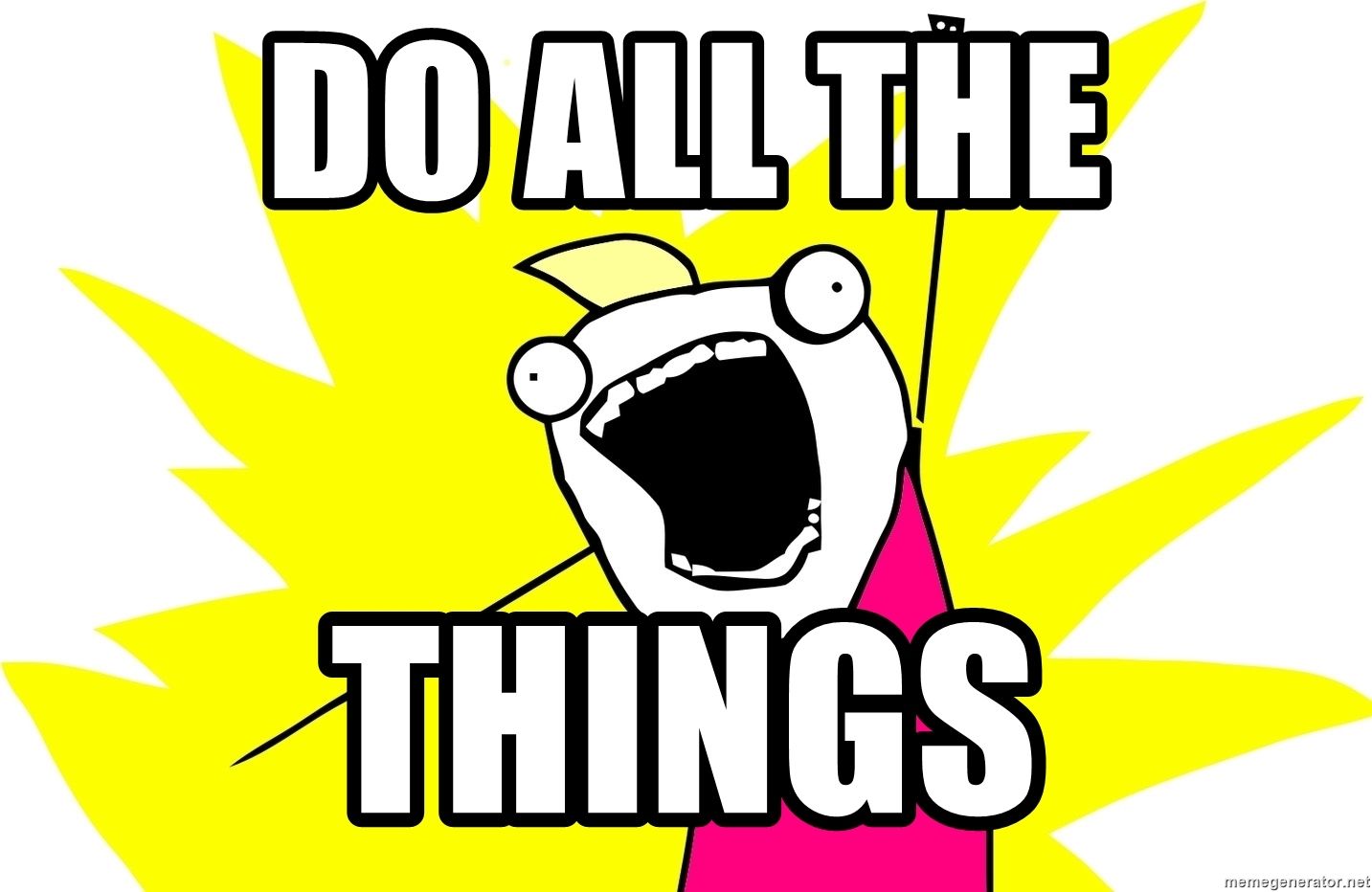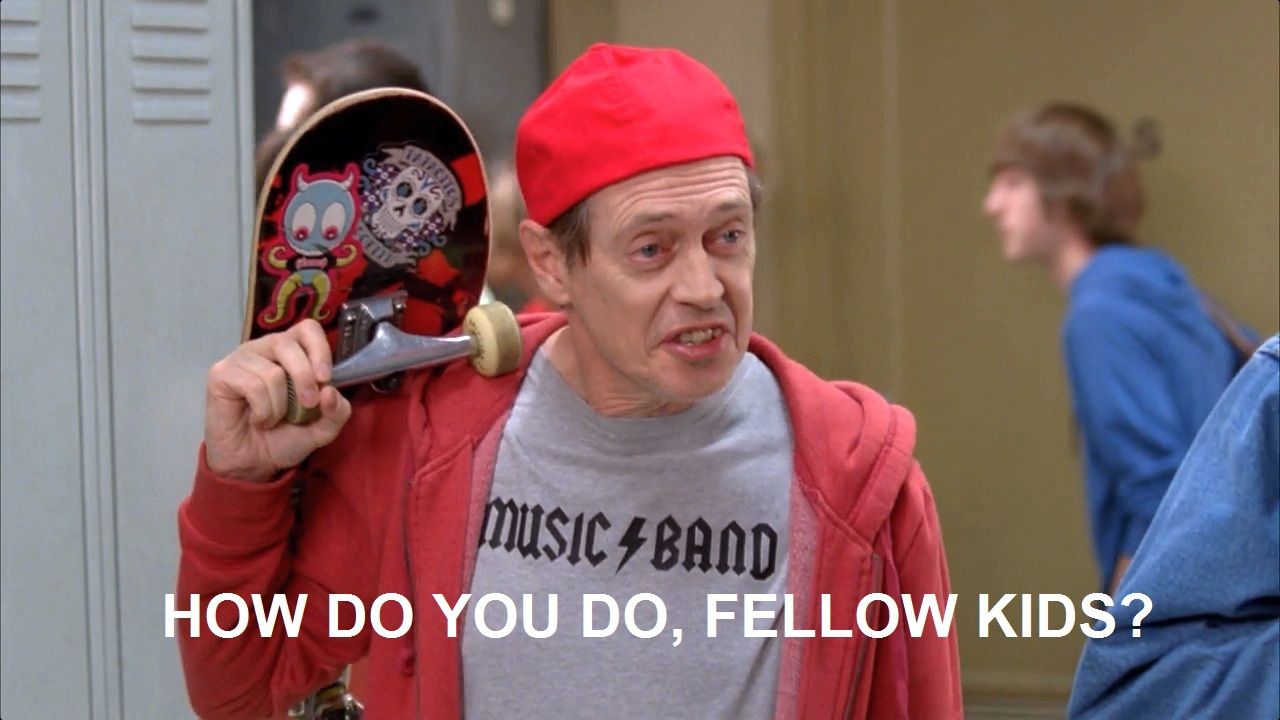Looking ahead... (start here for HMM)
Two weeks ago I semi-accidentally coined HELLAMETAMODERNISM as the name for the Californian (as opposed to Dutch or Nordic) school of metamodernism.

It's not quite time for New Year's resolutions, but it's been an interesting week or so and I thought I'd preview some ideas. Last week I appeared on Ryan Nakade's Meta-Ideological Politics, got into an amusing and interesting exchange with Daniel Schmachtenberger (and others) after joking that I'm allergic to him on a post by Scoutleader Wiley, and discovered that Joe Lightfoot's "Liminal Web" article is more controversial than I would have expected (I might write more on that last point in a future article).
But perhaps the single most interesting thing is that two weeks ago I semi-accidentally coined HELLAMETAMODERNISM as the name for the Californian (as opposed to Dutch or Nordic) school of metamodernism. Really, I was just recycling an in-joke that I already use too often out of context and observing that Californians say "hella" a lot. And then when commenting on my own post I realized it was actually a thing. So I guess I have to figure out what it is now!
That will be a focus in January and will lead to a more polished and cohesive article, but I do have some preliminary ideas to start with now...
HELLAMETAMODERNISM
I discussed a bit of the metamodern resonance of Caveat Magister's Turn Your Life Into Art in my last post, particularly noting how post-Boomer generations tend to value experience over things. I envision HELLAMETAMODERNISM (Yes, it must be all-caps. Probably. Until I get tired of it.) as an experiential approach to philosophy. More performance art, more participation, more practical guides and motivations to creating your own experiences. Such as Turn Your Life Into Art (henceforth TYLIA). Channels like Contrapoints that are performances rather than straight-up talking heads are also an influence, but I'd like to go weirder than that.
Indirect
A common thread I've noticed through Nora Bateson's Warm Data approach, TYLIA, and several other things recently is that for the really important stuff, you can't come at it head-on. I think that's part of what bothers me about a lot of the online philosophy scene, including but not limited to the "sensemaking" and "meaning crisis" fixations. It's not just that there's a limit to how much talking about these things on podcasts can accomplish, it's that talking directly about the things tends to founder on the intractable aspects of the problems.

Much of the talking does have its value, as analysis can and often does lead to insight. But I feel like there's a significant lack of follow-through. We analyze and analyze, and write think-pieces, record podcasts, and host zoom calls. But there's a whole world out there doing and being and we have largely detached ourselves from that. The white-maleness of online philosophy spaces is both a cause and consequence of that, I think. It's self-reinforcing.
I imagine most of us have noticed that it's pretty damn hard to talk someone into changing their mind these days. Even a phrase like "follow the science" has become a rallying cry for diametrically opposed worldviews. And not in the "we will science these things until they resolve" since. We just are dealing with outright contradictory claims as to what constitute science, or perhaps who has the authority on what grounds to determine what science is worth following. To say nothing of everyone who thinks watching some rando on the internet's YouTube video counts as "research."
Logical persuasion is dead. Which brings us to...
Experiential
I'm not that interested in trying to convince people of anything. I'm a lot more interested in creating the conditions for experiences that might cause people to reconsider things on their own (again, see TYLIA). Telling people things no longer works. Even showing has become inadequate. It is only through the felt sense of doing, together, in relationship with each other and community, that we can truly reach through the noise.
We're past the point of rational debate and that's a good thing! It turns out that rational debate is too easy to game, and excludes too much of reality to be a functional system of engagement. I like this phrase better than "sensemaking" because it allows for the fact that not all of life "makes sense."
Let's stop trying to fit reality into frames we construct in our heads. Instead, let's engage with reality to create experiences that engage each other in ways that help us understand and grow. Psychomagic is a way to unstick ourselves and others from our assumptions and routines, and that can create opportunities to learn and change in unexpected ways. Don't tell. Don't show. Do.

Intergenerational
I'm a later-to-tail-end Gen Xer, depending on how you define it. So my friends are mostly in the Gen X to Millennial range, with my social media feed in particular skewing more towards Millennials. Lately I've been coming to terms with being in the middle of the current generational spread, with the Boomers and fading Silents representing the past, and the Millennials and emerging Gen Z representing the future. Not that anyone really thinks about Gen X. Millennials and Gen Z are more culturally relevant, while Boomers and Silents retain their death grips on wealth and power. We're just kinda... here. Sometimes I identify more with Millennials if only because I'm not even sure what "being Gen X" means at this point.
Last week I was in a zoom call loosely organized around Gebserian integralism, and and older woman made a great comment about how much of what we were discussing there was the same as what she and her friend discussed while smoking joints at college in the 60s. One of the critiques of the "liminal web" article I mentioned is that it doesn't sufficiently acknowledge the lineage of similar and related efforts. It occurs to me that we often talk about how we lack elders in our culture, yet how often do we try to connect with those who might be able to take such a role? Boomers gave us the climate crisis, and also the beginnings of the modern environmentalist movement. They also created an enduring pop culture frame in the 60s and 70s. Even now there are college kids doing reaction videos to Boomer music on YouTube.
I also kept encountering Gen Z humor this week, culminating in someone dropping this video in a comment thread:
There's a lot that's important here, but the ambiguity of meta-irony is the most important thing, as shown by a quote from the comment section of another video that this video references:
"Because, ya know, edgy teens especially, they just... they wanna say stuff... to see how it feels -- to see how it sounds... coming out of their mouth. That's how they explore ideas -- that's how they try on world views, like gloves."
When you grow up knowing that anything you say can come back to haunt you, you need plausible deniability while you try ideas out. They can't just say stupid shit around their friends, forget about it, and end up keeping the ideas they like. The internet never forgets, and never forgives. they must never leave evidence that they thought the wrong thing at some point.
– YouTube user Anthony Westbrook, initially quoting YouTuber JrEg
You could look at this as some sort of sad commentary on so-called "cancel culture", but I look at it as an emergent cultural adaptation to the dynamics that gave rise to the behavior that some call by that name.
The rise of meta-irony and the ambiguity that is such a critical part of it both provides for new expression of humor and raises new questions on how to navigate meaning and move between humor and seriousness. Those looking for a "solution" to a "meaning crisis" that somehow reduces things back down to a logical approach will not like this. But the rational logic of modernity is the past, and we need to look at what the future, in the form of Gen Z, is showing us.
We also need to avoid thinking we can connect with them easily or directly:

Hellametamodernism needs to connect with the humor and culture of Gen Z, but it needs to do so indirectly (another theme as noted above) by bridging across a range of ages, rather than by having some Gen Xers and "geriatric" Millennials focus-group attempts to mimic humor that we don't speak natively.
This is also where the experiential orientation comes in. Gen X and Millennials are in a better position to construct and facilitate new experiences. Millennials occupy the prime adult cultural spot, and Xers have accumulated some experience and resources without reaching the level of cultural irrelevance of the Boomers. (Don't feel insulted, Boomers, those of us in Gen X will find ourselves irrelevant soon enough!) While some of the comments on that Gen Z video above lump Xers in with Boomers, there is a much longer thread a bit further down that notes some affinity between Gen X and Gen Z. The Zoomers with Boomer parents note that their humor doesn't translate at all, while those with Xer parents find more connection and appreciation (even if the Xers don't always get it).
Ultimately, as Zak Stein notes in the clip below (starting around 10:16 if the link doesn't drop you right there as it should), our generational disconnect has interfered with the process of cultural growth. We've had a series of disconnects rather than change built on what came before. We are in need of a way to re-integrate without just going back to the traditionalism of the past. I don't know what role the Boomers have to play here, but I don't want to count them out entirely. And any movement that is trying to move culture without engaging with the emergent generation seems doomed to fail. It is specifically those still forming their views and identities who can seed the most change for the future.
Hypercontextual ambiguity and narrative-surfing
Finally, I want to come back to the ambiguity present in meta-irony, and note that it is a fundamental characteristic of the complexity with which we need to learn to dance. So much of what I'm looking at now, whether it is the Warm Data process, meta-ironic humor, working with patterns that have traditionally been framed in "developmental" terms, or creating psychomagical experiences, requires an intense presence in the moment, with equally intense awareness of context.
"Hypercontext" is a word that popped into my head while I worked on this post. I am sure it's been used elsewhere, so by the time I write the fully public version of all of this I may be using another word. But I am thinking of "hyper" in the sense of "hyper-local" (being present and context-aware with what is happening here and now) and "hyperlinked" (remaining aware of connections to larger contexts, to transcontextual relationality, and the potential ability to jump across those connections when needed).
I was debating the narratives of modernity vs the deconstruction of postmodernity with someone on a discord, looking at what this meant for metamodernity. Reconstruction of narratives? Multiplicity of narratives (to incorporate postmodernity's skepticism of grand modernist mono-narratives)? What I preferred was what someone (I don't think it was me) labeled "narrative surfing." The idea of identifying, using, and releasing narratives as they become more or less relevant.
I don't think humans will stop constructing narratives anytime soon. But we will not return to a single shared cultural narrative as the traditionalists want. Nor can we sustain the endless battle of narratives (e.g. "alternative facts" and competing news ecosystems that agree on nothing) in which we find ourselves today. We need to engage with narratives hypercontextually. With deep awareness of their relation to and utility in the current time and place, and equal awareness of our ability to jump to other narratives as they become more useful.
I'm not really one for Buddhist non-attachment (a topic for another day), but there is relevance here in not clinging too tightly to the stories we tell ourselves about the world (and ourselves). Developing a comfort level with playing with narrative is something that meta-ironic contextuality, an indirect approach to problem-solving, and intergenerational connection all both support and require.
While I'm still developing the idea (tons of things happened in a discussion today, for example, and I haven't even been able to incorporate all of it in this post), I feel like this is at least a significant portion of the HELLAMETAMODERN toolkit.

